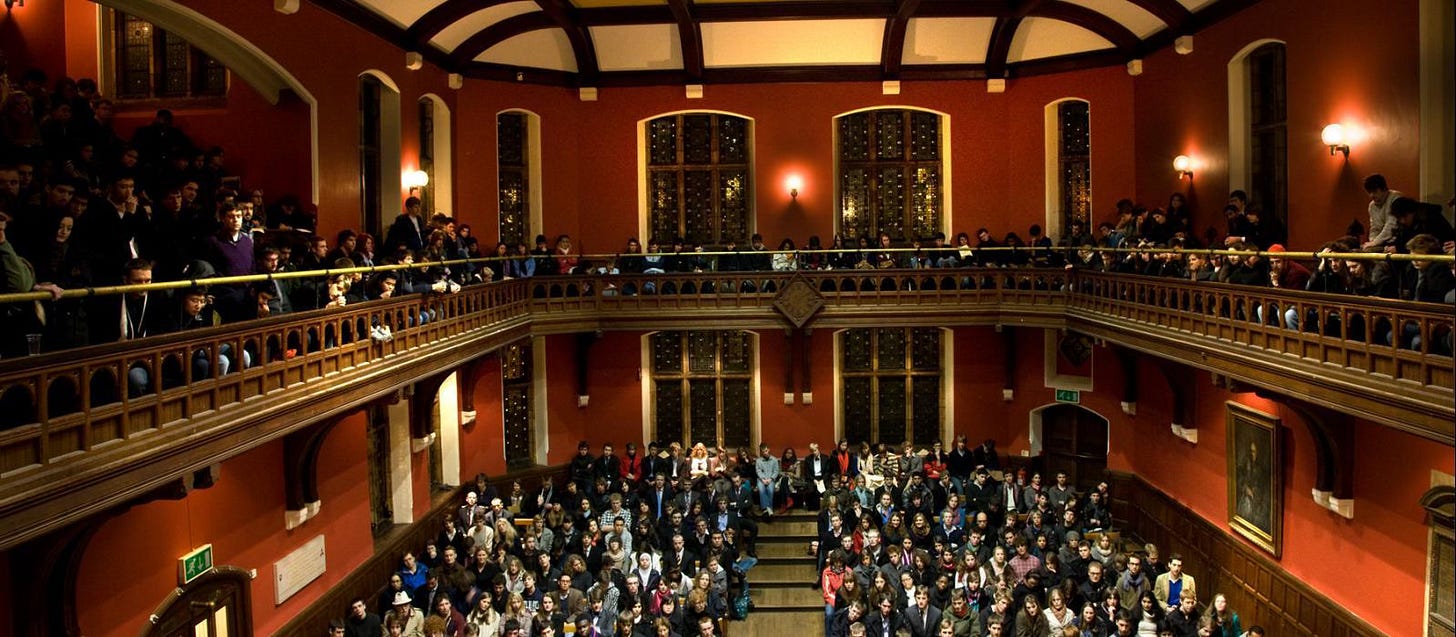Kant, Kirk, and the Cross: The Oxford Union Debates Christian Nationalism
The Oxford Union Debate: “This House Believes Christian Nationalism Does Not Exist”
The chamber of the Oxford Union is thick with anticipation. The vaulted ceiling catches the loud hum of students, their voices bouncing off the dark wood paneling and the rows of portraits staring down — Disraeli, Gladstone, Thatcher. The smell of leather and old books mixes with the faint autumn damp from coats and umbrellas shaken at the doorway.
The President of the Union gavels the room to order. “Tonight we debate the motion: This House Believes Christian Nationalism Does Not Exist. Speaking for the motion, Mr. Ben Shapley, columnist and editor of The Standard. Speaking against, Professor Margaret Whitcombe of the University of Manchester, historian of religion and politics.”
Ben Shapley (for the motion)
Shapley rises sharply, notes in hand but mostly ignored. Suit pressed, tie too bold. His tic: the quick jab of glasses back onto the bridge of his nose before delivering a line. His voice, nasal and clipped, slices the air.
“Ladies and gentlemen, Christian nationalism is a phantom conjured by the left. If it existed, you’d see pastors writing laws, catechisms in schools, bishops at the Pentagon. But nothing of the sort exists in America.
“What you saw at Charlie Kirk’s memorial? Prayer, the anthem, ordinary people grieving in faith. That’s not nationalism. That’s community.
“George W. Bush quoted Scripture, Joe Biden quotes the Pope. Are they Christian nationalists? Or is this just democracy in action, with citizens free to bring their faith into the public square?
“To cry ‘theocracy!’ at every hymn sung near a flag is dishonest. Christian nationalism, as a political project, does not exist.”
The Conservative benches clap. A few whistles echo.
Professor Margaret Whitcombe (against the motion)
Whitcombe stands slowly, small yet deliberate. Somewhat overweight, silver hair catching the light. She pulls her dress down over her haunches in an embarrassed human way. The chamber hushes.
“You American Christians can’t make up your minds. Are you so dizzy from your freedom that you need religion to steady you? Is God your crutch, your relief from the terrible burden of the self? Yet in the same breath you insist on your freedom. Which is it? Submission to God, or the dignity of autonomy? Make up your mind.”
Gasps, then laughter ripple through the benches. Students lean in.
“Kant — yes, Kant, the greatest of Enlightenment thinkers who no doubt influenced the founders of your America — answered this dilemma. He argued that morality is not handed down by church or scripture, but arises from the rational capacity of each individual. This is the heart of Enlightenment thought: the recognition that each person is an end, not a means.
“And remember: the Enlightenment was not a continuation of Christendom but a rejection of it. It was Europe’s escape from the Middle Ages, where the Church stifled inquiry and crushed dissent. Some even say Kant set out to prove God, but ended up disproving Him.
“So let us imagine: had the founders wanted a Christian nation, the First Amendment might have read: ‘Congress shall establish Christianity as the religion of this Republic, and laws shall conform to the laws of God.’ But no. What did they write? ‘Congress shall make no law respecting an establishment of religion.’ That is an agnostic state, built not on revelation, but on Enlightenment principles.
“And here is the irony. Today’s American right defends Christianity in the public square — but not the truth of God. They do not argue whether God exists, whether Christianity promotes equality or dignity. No, they speak only of Christian rights, of cultural survival. This is a shift away from realism — is it true? — toward instrumentalism — is it useful? Christianity reduced to utility, not truth. There is an obvious reason why they have chosen the transactional Donald Trump as their leader.”
A murmur spreads. Students slap benches in applause, shouts of “hear, hear!” ring from the gallery.
Shapley’s Rebuttal
Shapley smirks, thrusting a finger.
“Professor Whitcombe has delivered a fine lecture, but it is fantasy. America’s founders prayed, they invoked the Creator in our first founding document The Declaration of Independence—go and read it— and they understood that faith is the backbone of virtue. John Adams said, “our Constitution was made only for a moral and religious people. It is wholly inadequate to the government of any other.” To claim America is agnostic is to deny its culture, its soul, its history. Prayer in politics is not theocracy. It is freedom expressed!”
A handful of claps. One student calls out: “You dodged her point!”
Whitcombe’s Closing
Whitcombe’s voice drops, steady and grave.
“Mr. Shapley assures you there is no Christian nationalism, because there is no cross on the White House lawn—for now. But nationalism is not only written in laws — it is written in culture. When the flag and the cross are fused, when citizenship itself is measured by piety, that is Christian nationalism.
“The founders knew the peril of altar and throne intertwined. They built a wall — the First Amendment — to guard against it. Today, that wall is under siege by those who insist America belongs to Christians first, and everyone else second.
“Kant taught us that dignity lies in the individual, in autonomy, not in submission to outside authority. One could see some connection between Kant and the new gospels where Paul tells us in Christ there is neither Jew nor Greek, male nor female — this sounds egalitarian. But it was the Enlightenment that bequeathed us freedom. Must we now squander it by retreating into religion not for truth, but for comfort?”
The chamber erupts — benches pounded, cheers, some students on their feet. The portraits seem to nod from the walls, as if history itself were watching.



